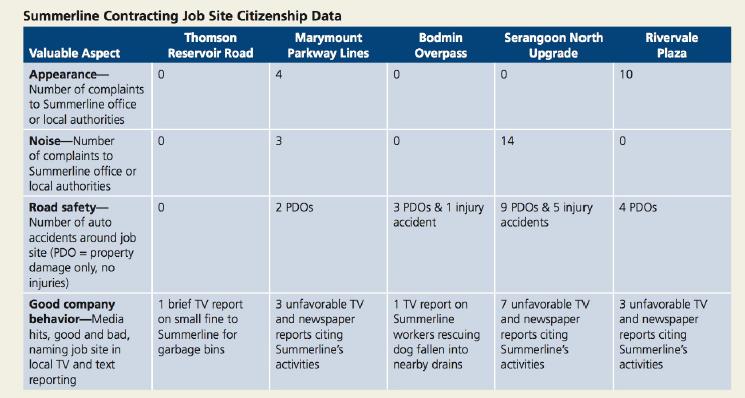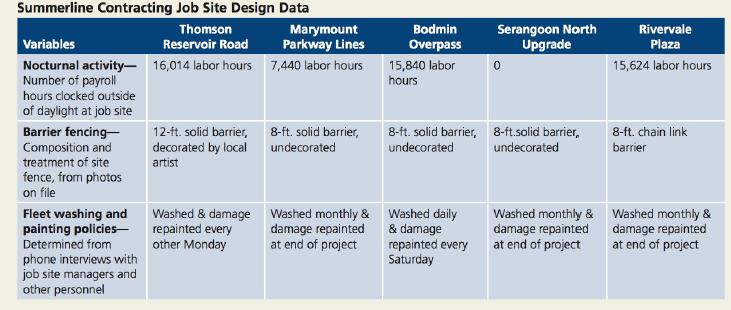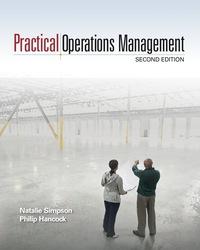Summerline Contracting specializes in large urban construc- tion projects, particularly transportation infrastructure such as tunnels and new
Question:
Summerline Contracting specializes in large urban construc- tion projects, particularly transportation infrastructure such as tunnels and new rail lines. Summerline's projects require that roads and other areas within a city center be taken out of daily use to serve as a job site, which Summerline may occupy for a year or longer. To win these high-value con- tracts, Summerline Contracting must maintain a reputation for both high-quality work and good citizenship in the neigh- borhoods that it temporarily occupies, as its activities are naturally disruptive to ongoing activity there. However, Sum- merline's management has always found the reputation for good citizenship is much more elusive than the reputation for high-quality work. While Summerline can proudly point to its finished products for quality inspection, its management can't always explain why some job sites are well received by sur- rounding residents and other job sites are costly to Summerline's reputation. Focus group discussions with residents nearby current job sites suggest that this reputation does rest on four different attributes:
Appearance. Sometimes residents actively complain about the ugliness of the nearby job site, whereas other times they have no opinion of it. Quiet. Nearly everyone interviewed expressed appreciation for a construction job site "keeping the noise down," but not everyone felt that Summerline Contracting attempted this. Road safety. Although Summerline works hard to keep its job sites safe, its activi- ties often cause unavoidable congestion in city traffic. In turn, this congestion sometimes causes a sharp increase in automobile accidents in the area. Summerline discovered that its reputation was being credited with both causing these accidents when they happen and preventing accidents when few occurred. Company behavior. While residents spoke of "good behavior," Summerline manage- ment relabeled these comments "public relations," because resident opinion of com- pany behavior appeared to be driven by what, if anything, they had read or heard about the job site in local media outlets. Although each focus group participant had an opinion of the company's behavior, almost no one had had any direct contact with Summerline personnel or knowledge of its broader business activities.
Summerline job site managers have not shown much interest in this citizenship project, because they claim there is very little that can be done at a job site to influence these four issues in the minds of nearby residents. To provide a high-quality product on time, effi- ciently, and with maximum safety for its own employees, all practices at all Summerline job sites are nearly identical. At a recent meeting, job site managers acknowledged only three variables among Summerline's sites: Nocturnal activity. Job site managers do make different choices concerning how much work to conduct at night. Activity scheduled outside regular business hours can be scheduled in overnight shifts, or during daylight hours on weekends and holidays. Barrier fencing. All job sites are surrounded by barrier fencing to keep them secure, but the degree of investment in that fencing varies. At one extreme, some job sites work behind 12-foot solid walls that have been painted by a local artist on the pub- lic side, while at the other extreme a few have only 8-foot chain link barriers that block neither the view nor the dust from the site itself.
Fleet washing and painting policies. All job sites operate a small fleet of vehicles and construction equipment. This fleet is washed regularly and even painted to repair natural wear marks at some locations, although less regularly at others. Opinion is divided among job site managers over how valuable this activity is. As a follow-up to the earlier focus groups, Summerline Contracting identified five similar past projects with which to explore these issues further. Management collected what data they could on each of the five job sites, as measures of each of four valuable aspects of citizenship discussed by the residents:
Summerline management then audited the records of each of the same five job sites, to determine what decisions were made concerning the three job site design variables:
Questions
1. Based on this data, develop a QFD-style matrix for Summerline Contracting, relating the four job site citizenship ratings to the three job site design variables. Document your steps in translating the information provided into workable forms for the cal- culation of correlation coefficients. State any important assumptions you made.
2. Based on your QFD analysis, if Summerline Contracting can invest in only one of the job site design variables for its next project, which do you recommend, and why? Which, if any, do you recommend that it avoid?
3. QFD analysis is limited to the assumptions of the correlation coefficients from which it is constructed. As a result, this style of analysis relies on simple pairings of pos- sible cause-and-effect relationships, and won't reveal if more complicated interac- tions exist, such as two design features each having a benefit, but the presence of both features canceling some benefit. Logically, could there exist more complex interrelationships among two or more of the job site design variables and one or more of the job site quality ratings, being missed by your matrix? If so, describe an example.
Step by Step Answer:






